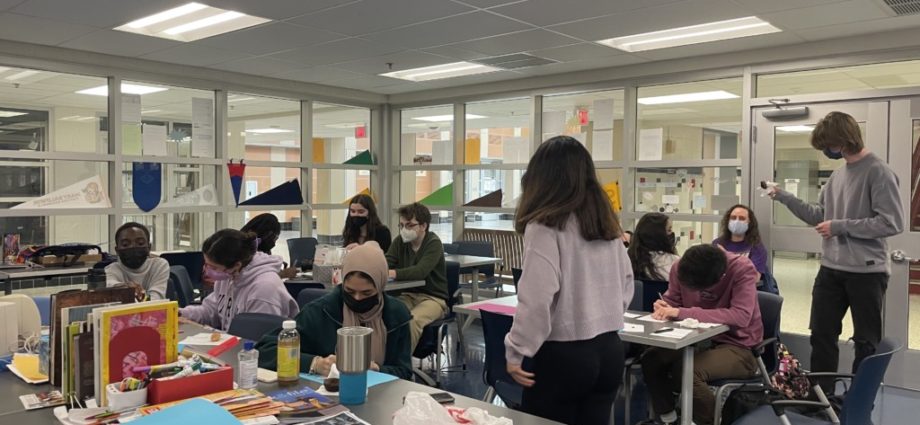With tests piling up and summer waving its smug fingers from two months away, the last quarter of the year is far from the easiest. Regardless, fourth quarter can be a time for reflection.
For some students, like president of Marshall Minds Matter club and senior Grace Chamberlain, this school year has felt like a success regarding mental health awareness.
“Compared to last year when we had to be all virtual, we definitely saw a spike in [meeting] attendance, which was really encouraging,” Chamberlain said.
She said in-person events like the club’s February “Share the Care” week were successful.
“We’ve gotten a lot of participation,” Chamberlain said, “Those [events] are always fun and a good way to promote our message.”
Junior Aila Seaman also said Marshall Minds Matter was a good resource for students.
“For students who want to openly talk about mental health, [it’s] a great club to join,” Seaman said.
However, Seaman said there are still issues with how mental health is perceived at school in general.
“A lot of times, especially around exam season, both students and teachers brush off feeling overwhelmed as something that is just part of ‘high school culture,” Seaman said. “If a student is really struggling with their mental health, they might not reach out for help because they think that constantly feeling tired and anxious is supposed to happen to everyone.”
Chamberlain said there is a disconnect between students and teachers when it comes to stress and anxiety.
“If we encourage more conversations about mental health at Marshall between students and teachers, I think that stress can go down quite a bit,” she said.
There have been events during the school year sponsored by administration or student groups to try to spread this awareness, but some, like the assembly on April 14, have been controversial.
“The assembly was good,” said freshman Carlotta Florio. “I liked it when she came and talked about her son, which is kind of hard, you know?” Florio said, referring to speaker and author Anne Moss Rogers. “[But] I felt a bit uncomfortable because I’ve had friends think about suicide. But it was successful.”
Chamberlain agreed.
“I enjoyed Anne Moss Rogers’ speech,” she said, “But I did hear that for some people, it made them a little bit uncomfortable, which I can understand because she talks about a lot of serious topics in her presentation.”
Chamberlain said the uncomfortable feelings she saw could have been related to how the assembly was explained beforehand.
“It was kind of advertised in Advisory as talking about resilience and coping strategies, and she’s not going to talk about [her son’s death] the whole time,” she said. “Whereas I felt that it was a common thread throughout the presentation, and I think that threw a lot of people off guard.”
For some students, like junior Lilyana Martinez, small group conversations help mental health awareness.
“I always like smaller discussions, because it’s more intimate and you get more feedback and more personal stories,” Martinez said.
Considering general mental health awareness, students had differing opinions on how it is perceived in the student body.
“I think mental health isn’t talked about much and people could be scared to share about their own struggles,” freshman Marissa Sherman said.
Chamberlain agreed.
“I don’t think that there’s necessarily a negative stigma around it, like ostracizing people who struggle with their mental health or excluding them in any way,” she said. “I think it’s just not talked about enough.”
Martinez said she believes there are stigmas around mental health, especially when terms like OCD and ADHD are used in non-medical situations.
“When it comes to students, I think people might invalidate someone else’s mental health and use it as kind of an additive, like, ‘Oh, I’m so OCD,’” she said.
Martinez said discussions at the beginning of the year in small classroom groups could be helpful to mitigate these kinds of responses.
“Not just anxiety and depression, but I think OCD should be talked about; I think ADHD should be talked about; I think autism should be talked about.” Martinez said. “I wish it was just presented in a better light than it is.”
2022-05-05

